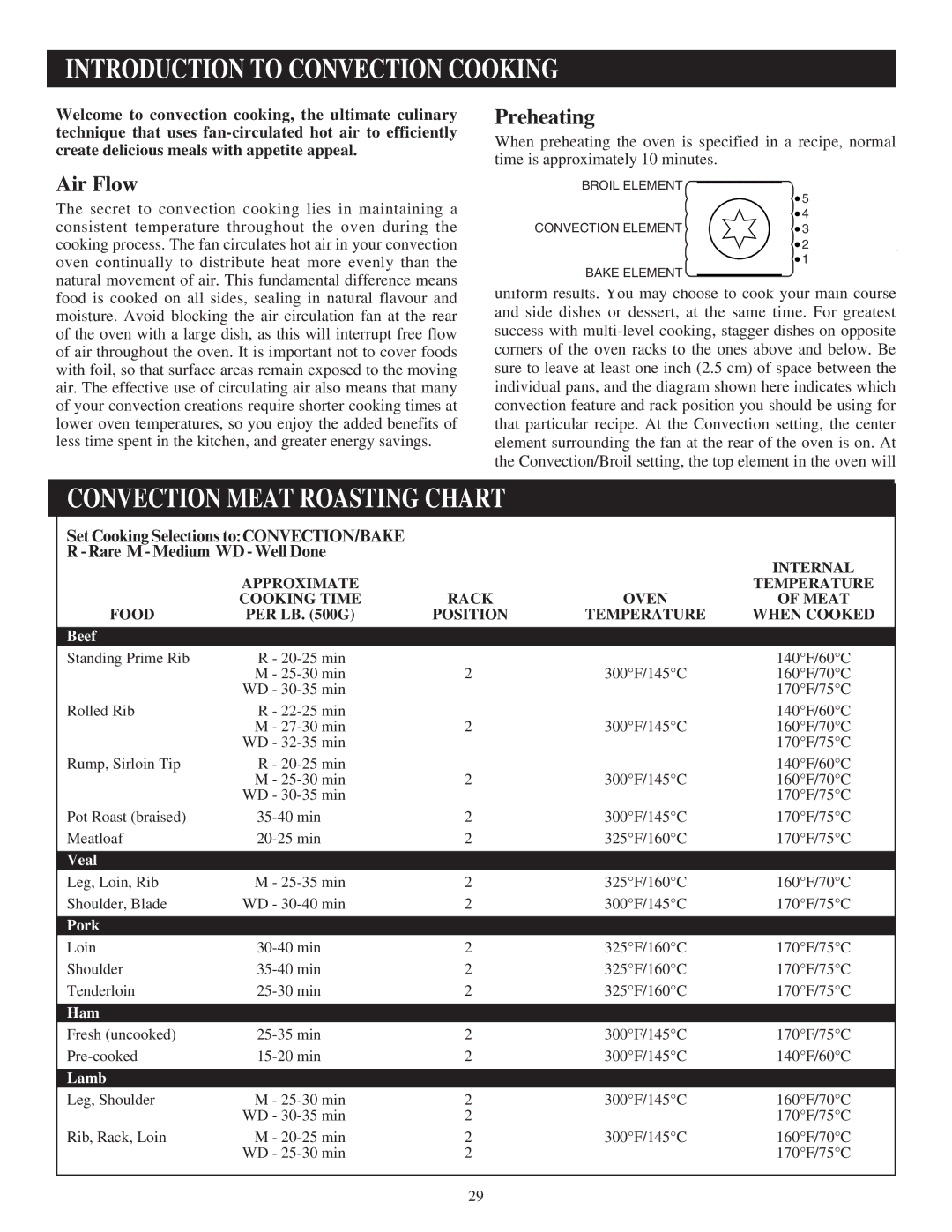
Introduction to Convection Cooking
Welcome to convection cooking, the ultimate culinary technique that uses
Preheating
When preheating the oven is specified in a recipe, normal time is approximately 10 minutes.
Air Flow
The secret to convection cooking lies in maintaining a consistent temperature throughout the oven during the cooking process. The fan circulates hot air in your convection oven continually to distribute heat more evenly than the natural movement of air. This fundamental difference means food is cooked on all sides, sealing in natural flavour and moisture. Avoid blocking the air circulation fan at the rear of the oven with a large dish, as this will interrupt free flow of air throughout the oven. It is important not to cover foods with foil, so that surface areas remain exposed to the moving air. The effective use of circulating air also means that many of your convection creations require shorter cooking times at lower oven temperatures, so you enjoy the added benefits of less time spent in the kitchen, and greater energy savings.
![]() 5
5
4
An immediate practical benefit of the convection cooking
CONVECTION ELEMENT3
method is that hot air movement allows you to2load the oven racks to capacity. For instance, you can bake 1four loaves of bread as quicklyBAKEasELEMENTyou might finish two, with outstanding, uniform results. You may choose to cook your main course and side dishes or dessert, at the same time. For greatest success with
Convection Meat Roasting Chart
Set Cooking Selections to: Convection/Bake
R - Rare M - Medium WD - Well Done
|
|
|
| internal |
| aPProximate |
|
| temperature |
| cooking Time | rack | oVen | of Meat |
Food | Per Lb. (500g) | Position | Temperature | When Cooked |
|
|
|
|
|
Beef |
|
|
|
|
Standing Prime Rib | R - |
|
| 140°F/60°C |
| M - | 2 | 300°F/145°C | 160°F/70°C |
| WD - |
|
| 170°F/75°C |
Rolled Rib | R - |
|
| 140°F/60°C |
| M - | 2 | 300°F/145°C | 160°F/70°C |
| WD - |
|
| 170°F/75°C |
Rump, Sirloin Tip | R - |
|
| 140°F/60°C |
| M - | 2 | 300°F/145°C | 160°F/70°C |
| WD - |
|
| 170°F/75°C |
Pot Roast (braised) | 2 | 300°F/145°C | 170°F/75°C | |
Meatloaf | 2 | 325°F/160°C | 170°F/75°C | |
|
|
|
|
|
Veal |
|
|
|
|
Leg, Loin, Rib | M - | 2 | 325°F/160°C | 160°F/70°C |
Shoulder, Blade | WD - | 2 | 300°F/145°C | 170°F/75°C |
|
|
|
|
|
Pork |
|
|
|
|
Loin | 2 | 325°F/160°C | 170°F/75°C | |
Shoulder | 2 | 325°F/160°C | 170°F/75°C | |
Tenderloin | 2 | 325°F/160°C | 170°F/75°C | |
|
|
|
|
|
Ham |
|
|
|
|
Fresh (uncooked) | 2 | 300°F/145°C | 170°F/75°C | |
2 | 300°F/145°C | 140°F/60°C | ||
|
|
|
|
|
Lamb |
|
|
|
|
Leg, Shoulder | M - | 2 | 300°F/145°C | 160°F/70°C |
| WD - | 2 |
| 170°F/75°C |
Rib, Rack, Loin | M - | 2 | 300°F/145°C | 160°F/70°C |
| WD - | 2 |
| 170°F/75°C |
29
